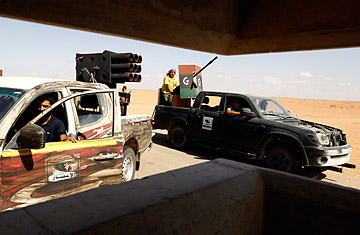
Anti-Gaddafi fighters stand on vehicles carrying weapons outside Khamis brigade's military base, which was destroyed by a NATO air strike, some 22 miles east of Bani Walid, September 7, 2011.
The news that some of Muammar Gaddafi's senior military officials fled into Niger on Tuesday, Sept. 6, following the arrival of Gaddafi's wife and three of his children in Algeria last week, has raised concerns that the Libyan regime's collapse could bring fresh violence to Libya's North African neighbors.
Two convoys of pickup trucks darted across Libya's remote Sahara Desert tracks into dirt-poor Niger on Tuesday, openly armed gunmen sitting atop several of the trucks as they bounced through mud villages, apparently unimpeded despite NATO surveillance and the ongoing hunt for the regime's key figures. A Libyan rebel official said Tuesday that Gaddafi had last been tracked to southern Libya, about 185 miles (300 km) north of the Nigerien border, but neither the ousted dictator nor his son Saif al-Islam Gaddafi were among those who crossed into Niger, according to U.S. State Department spokeswoman Victoria Nuland. She told reporters on Tuesday that Nigerien officials confirmed that senior Gaddafi regime and military officials had fled to Niger, despite the fact that all were listed on a U.N. travel ban forbidding them to leave Libya.
The ease with which some of Gaddafi's military officials — and, it's widely assumed, a cache of weapons — managed to slip out of the country seemed to confirm the fears of Libya's six neighbors that the rebellion could have drastic effects far beyond the nation's borders. "The conflict has been problematic," Idriss al-Jazairy, Algeria's ambassador to Geneva and one of the country's most seasoned diplomats, told TIME on Wednesday. "There has been a lot of gun-running as a result of open access to some areas. Terrorists have been able to access weapons."
Al-Jazairy said he believed large amounts of weapons — among them the contents of arsenals abandoned by retreating Gaddafi forces — might be smuggled across the region, complicating local efforts to counter al-Qaeda in the Islamic Maghreb and other extremist groups that have plagued the area. "There could be gun-running and drug-smuggling across the Sahel," al-Jazairy said, referring to the region stretching from Mauritania in the West to Chad in the East. Algeria, which has a 620-mile (1,000 km) border with Libya, made common cause with Gaddafi (and the U.S. and European powers) in cracking down hard on jihadist groups. Gaddafi jailed hundreds of members of Libya's Islamic Fighting Group, many of whom were freed from jail last month after the rebels seized Tripoli.
� With Gaddafi and his key aides still on the run, securing thousands of miles of remote borderlands with Libya's neighbors could prove increasingly difficult. Patchwork loyalties among remote tribes have been thrown into disarray by the fall of their erstwhile benefactor. For years, Gaddafi had poured billions into poor neighboring countries, cultivating alliances around the region, so the response to the Libyan rebel movement has been mixed. Gaddafi's loyalist forces have included�mercenaries from nearby nations as well as nomads from the Tuareg tribe, which straddles several North African borders and whose affections Gaddafi spent years nurturing by giving sanctuary to its fighters involved in insurgent wars with neighboring states. On Tuesday, the Tuareg rebel leader Rissa ag Boula was seen heading one of the convoys into the northern Nigerien city of Agadez, according to Abdoulaye Harouna, owner of a newspaper in that city, who spoke to the Associated Press.
It is possible that Gaddafi and Saif al-Islam will now try to use their regional connections to flee Libya. Hisham Buhagiar, the rebel leader in charge of the Gaddafi manhunt, told Reuters on Tuesday, "We have it from many sources that he's trying to go further south, towards Chad or Niger."
Throughout the rebellion, Gaddafi has vowed to fight and die in Libya rather than accept exile or surrender to a war-crimes trial at the International Criminal Court (ICC) in the Hague. But exile may become more attractive as he finds himself increasingly cornered. Because of the war-crimes indictments by the ICC against Gaddafi, Saif al-Islam and intelligence chief Abdallah al-Senousi, neighboring countries may face pressure to hand the men over should they arrive in their territory. Al-Jazairy said Algeria would not grant the men asylum, even though Algerian officials said the country had welcomed Gaddafi's wife, his daughter Aisha and his sons Hannibal and Mohammed on "humanitarian grounds." The same would not apply to those under ICC indictments, al-Jazairy said. "We are legalistic," he said. "Algeria will implement any decisions taken by the international community relating to Libya."
On Tuesday, Reuters cited French and Nigerien sources as saying secret talks were under way regarding exile for Gaddafi in Burkina Faso, the small West African neighbor of Niger. Burkina Faso's Foreign Minister, Yipene Djibril Bassolet, said last month that the country would "take whatever steps are necessary," including offering Gaddafi sanctuary, to end the fighting in Libya.
If Gaddafi does try to flee Libya, it's unclear whether the rebels and NATO would mount a massive campaign to stop him. NATO spokesman Roland Lavoie told reporters in Naples last month that NATO would "be happy" if Gaddafi and his family fled and added that the Libyan leader was "not a target" for NATO. But since then, NATO officials have confirmed that the alliance is indeed helping in the hunt for Gaddafi.
In a phone call to Reuters on Wednesday, Gaddafi spokesman Moussa Ibrahim said the ousted strongman was "in Libya" and that ultimately he would be remembered as a leader who defied international pressure. "He is in high morale," Ibrahim said. "He feels that this is what history will record, that he stood very honorably, very bravely, against the powers of evil."
